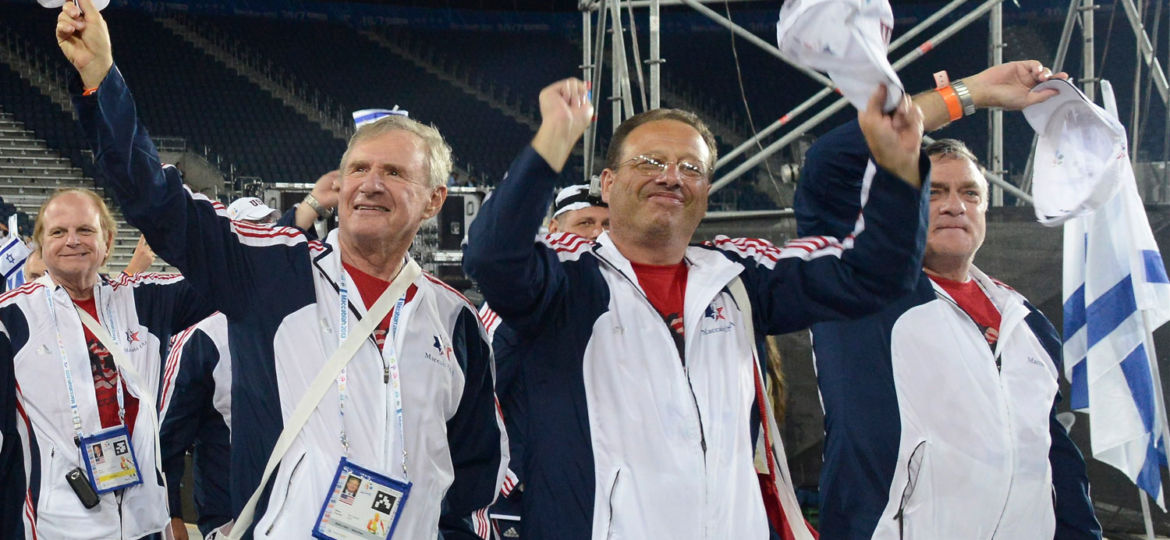
Written By Alex Burstein
Jeffrey Bukantz found himself down 7-5 in the Maccabiah fencing foil gold medal match back in 1989. But he still had one thing on his mind – winning gold.
Chasing after the same medal his dad had won 39 years earlier, Bukantz remembered a tactic – “keeping the distance” – that his dad had taught him. Five straight points later, and the gold was his.
“When I ripped off my mask, the tears were coming out of my eyes,” Bukantz said. “To no one else in the world did it matter. But to me it did. And to my dad too.”
Over three decades later, Bukantz, now the president of Maccabi USA, is even more involved with the Maccabiah than he was standing on the podium with gold around his neck. But his focus has changed, as he now moves past just looking for bronze, silver and gold.
“I feel that Maccabi USA, our success is not determined by how many medals we bring back home, but rather by how many Jewish chaplains you bring to Israel,” Bukantz said.
As president, Bukantz is one of the primary leaders in bringing a record-sized delegation to the 21st Maccabiah with more than 1300 athletes. Bukantz says this is the biggest traveling national delegation for a multi-sport event ever.
Through Maccabi USA, Bukantz has been able to connect a growing number of athletes to Israel, while also helping connect himself with the state.
“If not for Maccabi USA, my involvement, I’m not really sure how much involvement I would have in the Jewish religion. And through this involvement in the religion, I have helped expose thousands of Jewish athletes of all ages, especially young ones, to their culture, to their heritage, to the State of Israel,” Bukantz said.
Bukantz is especially proud of helping foster an experience that goes beyond just winning medals.
“They make lifelong friendships,” Bukantz said. “And we used to say, Bob Spivak used to, say, two weeks to experience a lifetime to remember, now it’s three weeks to experience a lifetime to remember. And we’re really proud of that.”
While Bukantz now focuses on more than medals, he is reflecting on the goals of the athletes making the international trip.
“It’s easy now because my competitive career is in the rearview mirror,” Bukantz said. “I have to put myself in the shoes of the current athletes and realize that for them, the medals are the most important thing.”
Bukantz did admit that he misses competing. While his competitive career, which included trips to the Olympics, may be over, his lessons learned from the sport are alive.
‘[Fencing is the] same as dealing with a bad teacher or a bad boss,” Bukantz said. “It teaches you a lot of life lessons, but I think discipline was the biggest one.”
That discipline has been on display for the duration of Bukantz’s fencing career, and now during his Maccabi leadership career.
On the fencing side of things, Bukantz stayed disciplined with his goal of winning the Maccabiah gold. After fourth and third place finishes in 1981 and 1985, he decided to skip the world championships in 1989 to again compete in the Maccabiah. It ended in a gold medal.
Burkantz took a similar path to his post-competitive days. Despite being asked to be president of USA fencing, he didn’t feel ready for the opportunity. Instead, he was eventually asked by former Maccabi USA president Ron Carner about running the organization. Bukantz was vice president at the time.
“It would be the completion of almost a half a century arc in this movement,” Bukantz said. “And I think I’m at a stage in my life where I’m ready to take this on. And I’m really happy that I did.”
So while Bukantz may be entering the Maccabiah with slightly different goals in mind than he did back in 1989, the excitement remains.
“You can see the finish line now,” Bukantz said. “I can’t wait to get there.”
